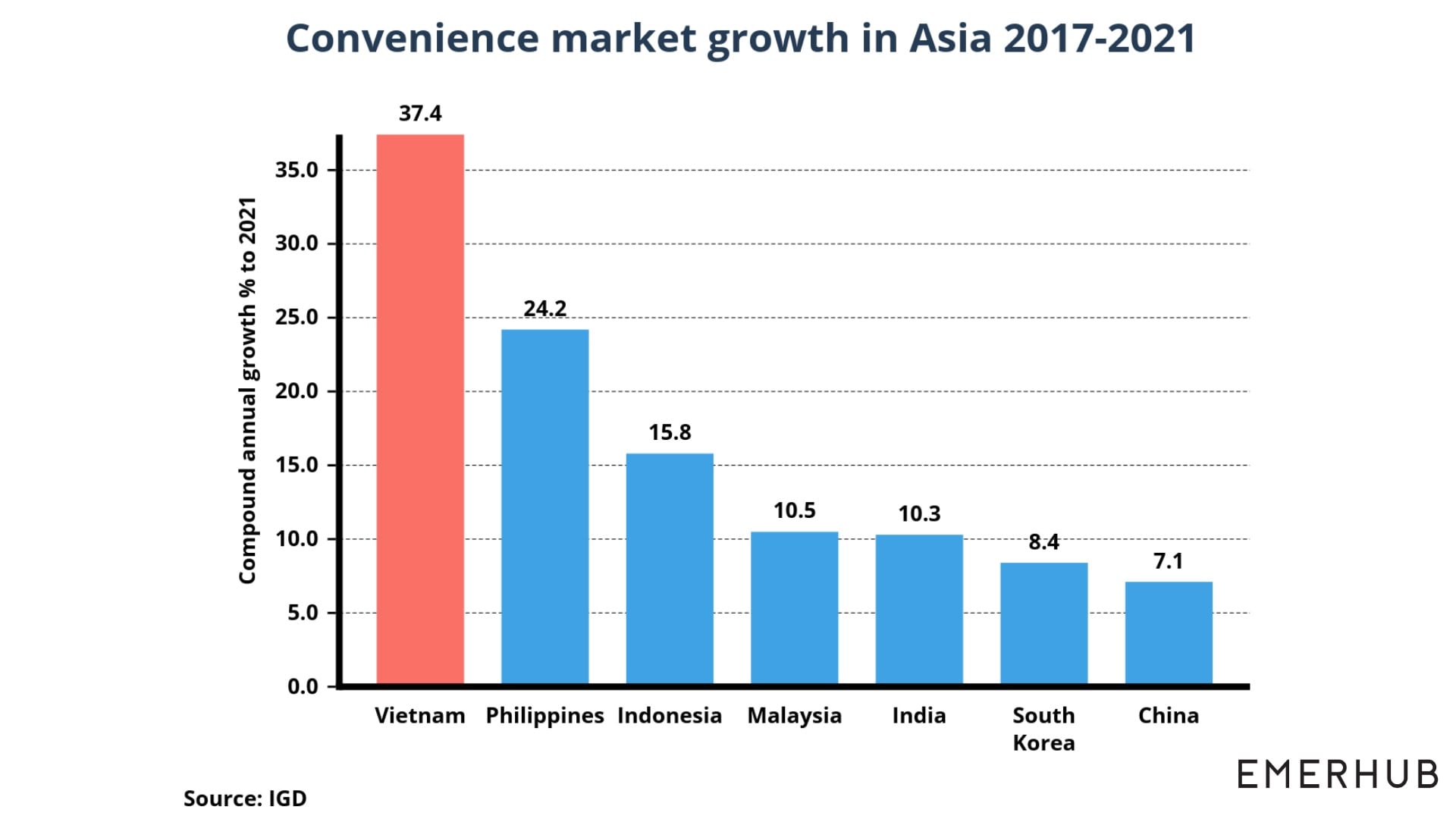Table of contents
Vietnam is the third largest market in Southeast Asia and one of the fastest-growing economies in the world. Its young population and robust consumer spending provide lucrative opportunities for many types of businesses. Particularly for those who are selling consumer goods.
How to enter Vietnam’s wholesale and retail market, and what are the requirements for foreign investors? In this article, we are going to walk you through the process of setting up a wholesale or a retail sales business in Vietnam.
Wholesale and retail sales in Vietnam in 2019
In 2018, the retail and wholesale sector was the second most popular sector for M&A deals in Vietnam. In its 2019 Foresight Report, research company CEIC Data highlights consumer goods as one of the industries with the highest M&A potential in Vietnam.
An international grocery research organization IGD also forecasts Vietnam to be the fastest-growing convenience store market in Asia by 2021.

You can register a wholesale or retail sales business in Vietnam in one month after which you can:
- open a bank account
- make the capital contribution
- hire staff
- apply for product registration
- obtain a trading license (for retail)
Contact us at [email protected] for a personal consultation to discuss your business opportunities in Vietnam.
The retail market in Vietnam
Retail, by definition, means the act of selling products to direct consumers (B2C), either by opening a physical shop or by selling goods online.
Recent years have seen an influx of investments in Vietnam, which has consequently brought along a rapid growth in Vietnam’s retail sector.
In AT Kearney’s latest Global Retail Development Index (GRDI), Vietnam ranks 6th among other markets with sustainable retail potential. While many of the Vietnamese still prefer buying their goods from physical shops, shopping online is on the rise as well.
According to Deloitte’s recent report on retail in Vietnam, Vietnam’s e-commerce market is forecast to grow second in Southeast Asia by 2025, only following Indonesia.
Biggest retailers in Vietnam
Some of the largest retailers in Vietnam are:
- Vingroup (e.g., VinMart supermarkets and VinMart+ convenience stores)
- TheGioididong (electronics)
- Circle K (convenience stores)
- Guardian (health and beauty)
One of the ways to enter Vietnam’s retail sector is via the M&A route. Foreign investors can also choose to franchise as their market entry strategy. In Vietnam, foreign investors can be franchisors as well as franchisees. It is also possible to expand your franchise to Vietnam without even setting up a company here.
Read our previous article to learn more about franchising or how to open a retail store in Vietnam.
How to set up a retail company in Vietnam?
Vietnam allows investors to set up 100% foreign-owned retail companies. The general process of registering a retail company in Vietnam is the same as for registering any other foreign investment company in Vietnam and takes up to one month.
Founders must first get the investment license and the business registration certificate (BRC). Once the necessary permits are in place, the company can register for taxes, open a bank account, and inject the capital contribution.
However, retailing in Vietnam also requires a trading license from the Ministry of Industry and Trade, which will add 6 to 12 weeks to the process. You can apply for it after the capital contribution payment.
Some products require registration before you can start importing them. You can register these products after incorporation. Certain products also need further testing, which you can already conduct earlier.
Note that you can start importing the goods once the products are registered or when the company obtains the BRC. However, you cannot sell them until you have a trading license.

The minimum capital requirement in Vietnam
There is no official minimum capital requirement in Vietnam for retail and wholesale companies.
However, keep in mind that the Department of Planning and Investment (DPI) will approve your investment based on whether the capital you stated complies with your planned expenses.
For example, if you are going to build or renovate physical shops to sell your products, the minimum capital contribution must include the cost of construction.
Selling online vs. opening physical shops in Vietnam
In Vietnam, you will need to register every physical retail shop you have. In the case of online selling, the registration of the website depends on the type of retailing you are going to conduct.
If you are going to operate a website to sell your products, it is sufficient if you only carry out a notification procedure for your website, which takes approximately ten days.
However, if you’re planning to operate an online marketplace or a classified in which different merchants gather to sell their goods, your website requires registration with the Ministry of Industry and Trade. The website registration procedure will take up to one month.
Find more information on website registration in our previous article on how to start an e-commerce business in Vietnam.
Wholesale in Vietnam
Wholesale is defined as sales between business to business (B2B), usually to distributors. While retail companies in Vietnam also need to obtain a trading license after incorporation, wholesale companies can start operating as soon as the company is registered.
Are you looking for manufacturers or wholesale suppliers in Vietnam? Emerhub can help you find suppliers and connect with them. Reach out to us at [email protected] to learn more.
How to register a wholesale company in Vietnam
The general company registration process is the same as described above for the retail company registration and takes up to one month.

If the products that you are going to wholesale in Vietnam don’t require registration, you can start importing after company registration. Products can be sold to businesses after they reach Vietnam.
Product registration in Vietnam
Note that not all products require registration in Vietnam. For example, you can import commodities without registering them.
In this case, both wholesale and retail sales companies can start importing goods to Vietnam as soon as the company is registered.
However, if a product does require registration, you can import it after registration. The exact timeline of registration depends on the product. For example, the registration of cosmetic products in Vietnam generally takes 15-30 working days.
Other products that must be registered are:
- electronics
- food and beverages
- medications
Keep in mind that while both retail and wholesale companies can start the import once the products are registered, retail sales company cannot sell products before they have also obtained a trading license.
Ready to start your wholesale or retail sales business in Vietnam?
Emerhub is here to help you every step of the way. Contact our consultants for a personal consultation at [email protected] or leave your details in the form below and we will get back to you shortly.







